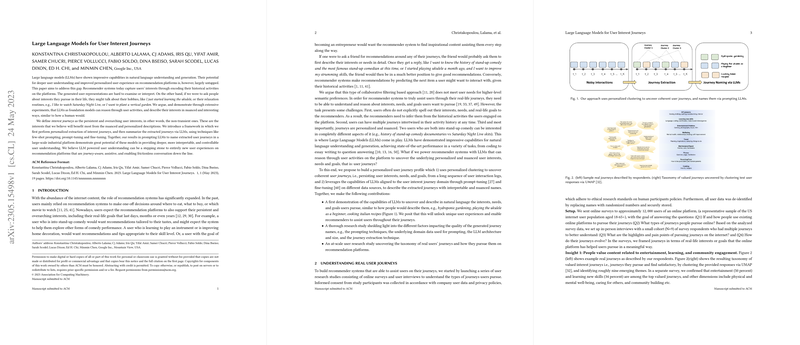LLMs Enhancing User Interest Journeys in Recommendation Systems
Overview
In the burgeoning field of recommendation systems, the utilization of LLMs holds significant potential to advance personalization and user experience. Google Inc.’s paper explores this potential, focusing on how LLMs can be effectively deployed to understand and articulate user interest journeys. Unlike traditional models which often rely on interpreting historical user activity data, this approach hinges on reasoning through user interactions on recommendation platforms to deduce nuanced and personalized user interest journeys. Through extensive experiments, the research showcases the capability of LLMs to describe user interests in a manner reminiscent of human conversation, thereby fostering a deeper level of personalized user experience.
Methodology
The foundation of this research rests on two main components: personalized extraction of user interest journeys and their subsequent naming through LLMs. The process commences with the clustering of user interactions to identify coherent interest journeys, following which techniques such as few-shot prompting, prompt-tuning, and fine-tuning are employed to refine LLMs' capacity to generate descriptive, human-like names for these journeys.
Designing the Journey Service
The journey service crafted for this paper encapsulates the essence of personalization in recommendation systems. It delineates user journeys by aggregating user-item interactions into clusters, which are then named through the adept application of LLMs. The paper introduces an algorithm, Infinite Concept Personalized Clustering (ICPC), optimized to perform personalized clustering by leveraging salient terms within user interactions, thereby achieving thematic coherence.
Leveraging LLMs
Building on LLMs such as LaMDa and PaLM, the paper explores various methodologies to tune these models for the domain of user interest journeys. The exploration spans few-shot prompting, prompt-tuning, and fine-tuning techniques, each examined for its effectiveness in generating accurate and nuanced journey names. This exploration is bolstered by the use of high-quality domain-specific datasets for model alignment, notably utilizing user-curated playlists as proxies.
Results and Findings
The paper presents several key findings:
- Personalized Clustering Efficiency: The proposed method, ICPC, demonstrates superior ability in clustering user interactions into coherent thematic journeys compared to non-personalized baselines.
- Effectiveness of LLMs in Journey Naming: Through prompt-tuning based on quality datasets, LLMs can generate interpretable and nuanced names for user interest journeys. Furthermore, prompt-tuning outperforms both few-shot prompting and fine-tuning in generalization capability across different experimental setups.
- Model Variation and Data Source Impact: The paper underscores the significance of the underlying model architecture and the data used for prompt-tuning in determining the quality of generated journey names. Larger models and expert-curated collection-based prompting data generally yield better results.
Implications and Future Directions
The application of LLMs to understand and articulate user interest journeys presents a promising avenue toward enhancing personalized recommendations. This approach not only offers a deeper understanding of user intents but also enables more meaningful and engaging user experiences on recommendation platforms. Future research may explore the integration of journey-aware recommendations, the scalability of personalized clustering algorithms, and the exploration of user feedback mechanisms for continuous model improvement.
In conclusion, this paper provides compelling evidence of the potential benefits of integrating LLMs into recommendation systems to encapsulate user interest journeys accurately. Through sophisticated personalized clustering and the nuanced naming of user journeys, LLMs can indeed pave the way for a new era of personalized user experiences in recommendation systems.
